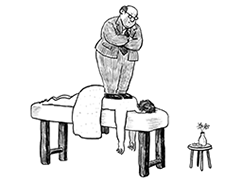
Step 7
Get the Banker Off Your Back
Most people have a home loan. Very few people go through this process of systematically knocking down their mortgage, and that’s exactly how your lender likes it. But not you…
There are only two ways to pay your mortgage off faster:
Lower your interest rate.
Make extra repayments.
We’re going to do both.
If your home loan is with a big bank, there’s a good chance you’re getting screwed. Generally speaking, the banks don’t do the best deals on home loans because they don’t need to. So, let’s talk about what you really need from your home loan.
Rule 1: Don’t get the bells and whistles
A home loan is a pretty simple proposition: you borrow money from the bank to buy a home, and then pay it back with interest over 25 to 30 years.
Most of the bells and whistles the banks market as ‘special features’ are rubbish — their main purpose is to bamboozle you into paying more for things you rarely use. So stay away from repayment holidays, fixing a portion of your loan and anything else dreamed up by a marketing dude with a ponytail. This is where the banks make their margins.
Rule 2: Don’t fix your rate
Repeat after me: ‘I promise to stick with the lowest variable rate I can find, regardless of what my brother-in-law Eric recommends at Christmas lunch’.
Here’s what Eric will say: Man, I got a great deal on a fixed rate — and it’s locked in for five years.
Here’s your reply: Yes, Eric, the banks are offering fantastic fixed-rate deals, many lower than the standard variable — and there’s a reason. It’s not because they want to help you pay off your loan quicker. Rather, since the government banned exit fees, the banks have had to find another way to stop their customers switching to a better deal. Fixed-rate loans give them that power. And, Eric, if interest rates drop lower than your fixed rate, your bank will slug you with a ‘break fee’, representing the difference between the two rates, multiplied by the length of time left on your fixed contract — which can add up to thousands of dollars.
So much for Eric.
The only reason you’d fix your rate is if you’re really struggling so you have the security of fixed repayments, but for everyone else it’s too much of a gamble.
Rule 3: Get the cheapest rate possible
Truth is, just as with many relationships, it’s easier to bitch to your current bank than it is to go through the hassle of switching to another one.
Here’s the deal: it costs your bank about $1000 in marketing costs to replace you (and about six times that amount if you come via a mortgage broker they pay kickbacks to). That’s your negotiating power right there.
So, research the best deal on the market, call your bank and threaten to refinance with someone else if they don’t drop your rate.
Trust me, this works. I’ve had hundreds of people tell me they’ve used this strategy to get a better deal on their home loan, without the hassle of refinancing.
But, if the bank calls your bluff – don’t bitch, switch.
Make extra repayments
So we’ve got you the cheapest variable rate on the market, now it’s time to get the banker off your back faster and make extra repayments.
If you pay just $1000 extra (on top of your minimum repayment) a month off your home loan, along with getting a cheaper rate, you’ll save $77641 in interest and wipe almost seven years off your mortgage (based on a $400,000 mortgage over 18 years).
The day I paid off my mortgage was the proudest day of my financial life. I swear the grass under my bare feet felt different.
And once you get the banker off your back, it’ll be the same for you too.
Get word-for-word scripts for negotiating a better deal on your home loan in my book, The Barefoot Investor: The Only Money Guide You’ll Ever Need. Order your copy here.

